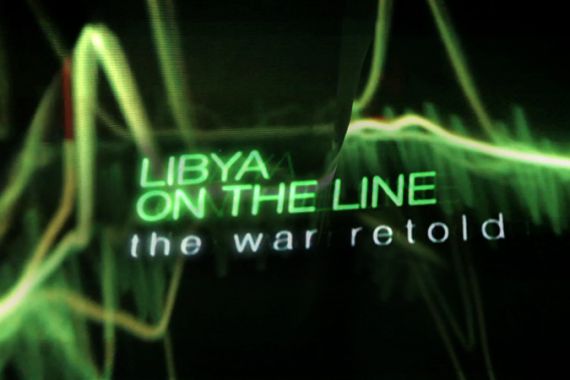A new side of the war: A personal reflection
Al Jazeera’s Hoda Abdel-Hamid, who uncovered the recordings, reflects on listening to Gaddafi’s private conversations.

“How do you feel about listening to phone conversations?”
This was not the first time I heard about wiretaps in Libya. Gaddafi’s state television had aired phone conversations between Mustafa Abdel Jalil and Western officials. The opposition, too, published a few dozen of them just after the fall of Tripoli – a way to keep the momentum going, since Gaddafi was still on the run.
So I confidently said that I’d already heard them. “No, no,” my contact said. “This is different.”
The next day, he showed up with a hard disk. My first surprise was the sheer number of recordings: more than 12 thousand in total.
I started randomly clicking through the clips. There were the voices of Gaddafi himself, and his sons Saif al-Islam, Saadi, Mohamed. The more I clicked, the more I discovered. There was prime minister Al-Baghdadi Al-Mahmoudi, intelligence chief Abdullah Senussi, and many other Libyan officials – people we’d heard less about, but who appeared to be playing an active role during the uprising.
I was discovering a whole new side of last year’s war.
‘They ruined our reputation’
I soon realised the job was daunting: How am I going to go through all of this? And even though I speak Arabic fluently, I needed the help of a Libyan.
A few days later, back in Doha, Suleiman El Dressy (the producer in our Tripoli bureau) and I sat in a small room armed with our laptops and speakers. It took six weeks to go through the calls. These were 24/7 recordings, so we heard a wide range of conversations, including the mundane ones: gossip about defectors, analysis of the international community’s statements, even personal feelings.
The prime minister once said, in a late night conversation with Senussi, “the bombings are too intense. I personally cannot stand it.” In another conversation, he was upset that he had been branded as a thug who was paid off by Gaddafi. It happened on May 6th, after the Libyan contact group met in Rome.
Al-Mahmoudi: They ruined our reputation.
Senussi: What did they say?
Al-Mahmoudi: That we are thugs that Muammar brought with his money.
Senussi: It’s good. Why are you upset?
Al-Mahmoudi: It upset me, really.
Senussi: They said it like that?
Al-Mahmoudi: That’s what it meant.
Many of the conversations were wiretaps of the phone of a man called Tayeb El Safi. I knew very little about him. As we clicked, we realised that he was one of Gaddafi’s most loyal henchmen, and that he played a crucial role during the entire eight months. He was “Mr. East” of the regime: He had a huge network of informants in Tobruk, Benghazi and Ajdabiya.
Two conversations come to my mind.
The first one was by a certain Colonel Abdallah. It might not be his real name, but he was in the operations room next to General Abdel Fattah Younes (the rebel commander), and onpassed information about what was happening there, and Younes’ movements, to and from the front line.
The second one came as late as April 11th. Someone called the prime minister, and informed him that he spoke to the driver of Mustafa Abdel Jalil.
“He just got a Thuraya [a satellie phone]. He said that the situation is ready for your return. Gimenes, Soluak, Al Abyar, Al Agouria and Deriana are all with you [the regime].”
“He also said that there are no families left in Benghazi; whoever could afford it, left. He said people want you, the Gaddafi government, back. They [the NTC] are mistreating people. Khalifa Hefter and Abdel Fattah Younes dont even meet. Khalifa and Omar Hariri [the NTC defence minister at the time] are based at the Gulf company, and Abdel Fattah works alone. He said he cannot work with Hefter.”
Many informants were also giving wrong information, or maybe simply telling their bosses what they wanted to hear.
The recordings received by Al Jazeera start from February 15th, four days after Hosni Mubarak of Egypt was ousted. Tripoli knew something was in the offing: Saadi Gaddafi, the prime minister, Senussi and other top officials made their way to Benghazi. Their mission was to find a solution to popular grievances. But it was too little, too late.
The recordings reveal a lot of confusion and ongoing debates on how to treat the protesters.
Throughout the months, we discover a regime trying to cling to a country that is slipping away from their hands. Some of the analysis from the international community was flawed. At one point, the notorious government spokesman Moussa Ibrahim congratulates himself because “now no one is talking anymore about changing leadership”.
Suleiman – our Libyan producer – had a good laugh at this one. But in other instances he got really angry. “As a Libyan, I was surprised to hear how much they were still in denial when they were speaking among themselves. The inner circle was living an illusion; they made Gaddafi believe that he could make us raise his green flag. They were telling him that it could all be contained. I blame those henchmen for the all the bloodletting,” he told me.
But Suleiman is most angry about a plan that was hatched over the phone between a man calling from Harawa, near Sirte, and Tayeb El Safi. It happened in early March – before the UN resolution.
Both men decided to send food supplies to Ben Jawad, so that “the people in areas east of there go hungry, so they feel the difference.”